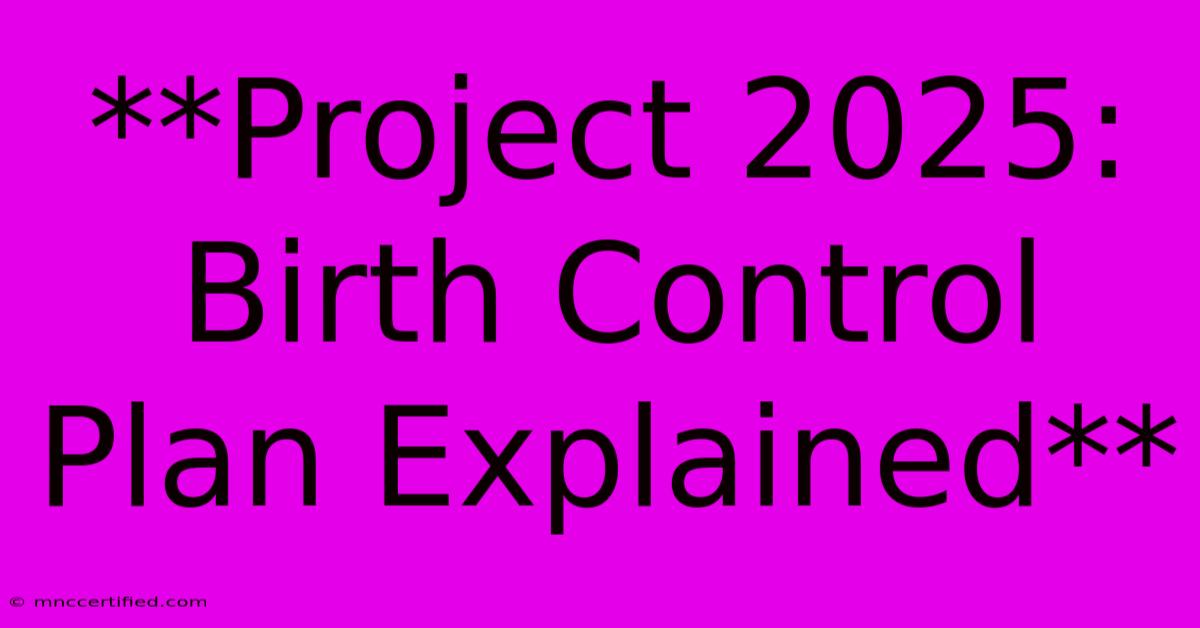**Project 2025: Birth Control Plan Explained**

Table of Contents
Project 2025: Understanding the Birth Control Plan
The term "Project 2025" has been circulating online, often linked to conspiracy theories about a supposed global population control agenda. However, there is no official, globally recognized program or initiative called "Project 2025" with a specific focus on birth control.
This article aims to clarify the misinformation surrounding this term, debunk conspiracy theories, and provide accurate information about family planning and population control initiatives.
The Misinformation and Conspiracy Theories
The idea of "Project 2025" likely stems from various sources, including:
- Misinterpreted Data: Population projections by organizations like the United Nations can be misinterpreted as a "plan" to control population growth.
- Anti-Vaccination Sentiment: Some groups opposed to vaccination falsely link it to population control efforts, drawing parallels to nonexistent projects like "Project 2025."
- Misleading Online Content: Social media and certain websites spread misinformation about government-sponsored birth control programs, often without credible sources.
It's crucial to note that these conspiracy theories are not supported by evidence. No credible scientific or governmental organization promotes a "Project 2025" focused on forced or mandatory birth control.
Family Planning and Population Control: A Clearer Picture
While "Project 2025" is a fabricated concept, it's important to understand the real issues surrounding family planning and population control.
- Family Planning: Providing access to information and resources for contraception, abortion, and sexual education is vital for women's health and empowerment. It allows individuals to make informed decisions about their reproductive health and family size.
- Population Control: The term "population control" is often used in a negative light, suggesting forced or unethical methods. However, sustainable population management involves promoting responsible family planning practices, addressing poverty and inequality, and ensuring access to healthcare and education.
It's essential to distinguish between ethical family planning initiatives and the unfounded claims associated with "Project 2025."
The Importance of Critical Thinking
When encountering information online, particularly regarding sensitive topics like population control, it's crucial to:
- Verify Sources: Ensure information comes from credible and reputable organizations, like the World Health Organization (WHO) or the United Nations Population Fund (UNFPA).
- Be Skeptical of Sensationalist Claims: Beware of websites and social media accounts that spread unfounded theories or use inflammatory language.
- Consider Multiple Perspectives: Seek out diverse viewpoints and be cautious of biased information.
By practicing critical thinking and verifying information, we can combat misinformation and foster a more informed and responsible conversation about family planning and population control.
Conclusion
"Project 2025" is a fabricated concept fueled by conspiracy theories. It is essential to understand the difference between real family planning initiatives and unfounded claims. By staying informed, engaging with credible sources, and practicing critical thinking, we can combat misinformation and promote a more nuanced understanding of population issues.

Thank you for visiting our website wich cover about **Project 2025: Birth Control Plan Explained** . We hope the information provided has been useful to you. Feel free to contact us if you have any questions or need further assistance. See you next time and dont miss to bookmark.
Featured Posts
-
Elie Honig Jack Smiths Possible Outcomes
Nov 07, 2024
-
Bayern Munich Vs Benfica Match Begins
Nov 07, 2024
-
Us Senate Shifts To Republican Control
Nov 07, 2024
-
Dogecoin Surges 25 On Trumps White House Visit
Nov 07, 2024
-
Online Subutex Doctors That Take Insurance
Nov 07, 2024